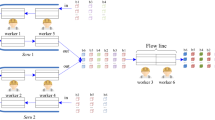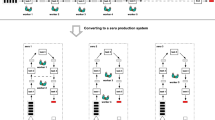Abstract
Product information is constantly changing in actual production; examples include batch due date changes, batch size changes, and the arrival of emergency batches. However, most studies of seru production have focused on the static seru systems. Therefore, this study investigated the total tardiness of the dynamic seru production considering seru formation changes. When product information changes, four decision processes were considered for optimal solutions: 1) selection of seru(s) for re-formation (SSR); 2) batch scheduling on the seru(s) waiting for re-formation (BSSWR); 3) seru re-formation; and 4) seru re-scheduling. A dynamic seru production model was established here based on the above process, and a phased intelligent algorithm was proposed for solving this problem. SSR was optimized using a genetic algorithm. The earliest due date (EDD) heuristic algorithm was used for BSSWR. Moreover, an adaptive cooperative coevolution algorithm was proposed, in which Q-learning was used for determining whether to optimize seru re-formation or seru re-scheduling. After extensive experiments, the dynamic seru production system considering the seru formation changes reduced the total tardiness by an average of 54% compared with the original solution, and by an average of 15% compared with the dynamic seru production system considering only the seru scheduling changes.


















Similar content being viewed by others
References
Yin Y, Stecke KE, Li D (2018) The evolution of production systems from Industry 2.0 through Industry 4.0. Int J Prod Res 56(1-2):848–861. https://doi.org/10.1080/00207543.2017.1403664
Zhang Z, Song X, Huang H, Yin Y, Lev B (2022) Scheduling problem in seru production system considering DeJong’s learning effect and job splitting. Ann Oper Res. https://doi.org/10.1007/s10479-021-04515-0
Wu Y, Wang L, Chen J- (2021) A cooperative coevolution algorithm for complex hybrid seru-system scheduling optimization. Complex & Intelligent Systems 7(5):2559–2576. https://doi.org/10.1007/s40747-021-00432-8
Sun W, Yu Y, Lou Q, Wang J, Guan Y (2020) Reducing the total tardiness by Seru production: model, exact and cooperative coevolution solutions. Int J Prod Res 58(21):6441–6452. https://doi.org/10.1080/00207543.2019.1680898
Liu C, Li Z, Tang J, Wang X, Yao M-J (2021) How SERU production system improves manufacturing flexibility and firm performance: an empirical study in China. Ann Oper Res, https://doi.org/10.1007/s10479-020-03850-y
Liu F, Fang K, Tang J, Yin Y (2021) Solving the rotating seru production problem with dynamic multi-objective evolutionary algorithms. Journal of Management Science and Engineering, p S2096232021000305, https://doi.org/10.1016/j.jmse.2021.05.004
Yilmaz O F, Durmusoglu M B (2018) A performance comparison and evaluation of metaheuristics for a batch scheduling problem in a multi-hybrid cell manufacturing system with skilled workforce assignment. Journal of Industrial & Management Optimization 14(3):1219–1249. https://doi.org/10.3934/jimo.2018007
Ying K-C, Tsai Y-J (2017) Minimising total cost for training and assigning multiskilled workers in seru production systems. Int J Prod Res 55(10):2978–2989. https://doi.org/10.1080/00207543.2016.1277594
Lian J, Liu C, Li W, Yin Y (2018) A multi-skilled worker assignment problem in seru production systems considering the worker heterogeneity. Computers & Industrial Engineering 118:366–382. https://doi.org/10.1016/j.cie.2018.02.035
Yılmaz O F (2020) Attaining flexibility in seru production system by means of Shojinka: An optimization model and solution approaches. Computers & Operations Research 119:104917. https://doi.org/10.1016/j.cor.2020.104917
Yılmaz O F (2020) Operational strategies for seru production system: a bi-objective optimisation model and solution methods. Int J Prod Res 58(11):3195–3219. https://doi.org/10.1080/00207543.2019.1669841
Zhang Z, Song X, Huang H, Zhou X, Yin Y (2022) Logic-based Benders decomposition method for the seru scheduling problem with sequence-dependent setup time and DeJong’s learning effect. Eur J Oper Res 297(3):866–877. https://doi.org/10.1016/j.ejor.2021.06.017
Liu F, Niu B, Xing M, Wu L, Feng Y (2021) Optimal cross-trained worker assignment for a hybrid seru production system to minimize makespan and workload imbalance. Computers & Industrial Engineering 160:107552. https://doi.org/10.1016/j.cie.2021.107552
Fujita Y, Izui K, Nishiwaki S, Zhang Z, Yin Y (2022) Production planning method for seru production systems under demand uncertainty. Computers & Industrial Engineering 163:107856. https://doi.org/10.1016/j.cie.2021.107856
Sun L, Lin L, Gen M, Li H (2019) A Hybrid Cooperative Coevolution Algorithm for Fuzzy Flexible Job Shop Scheduling. IEEE Trans Fuzzy Syst 27(5):1008–1022. https://doi.org/10.1109/TFUZZ.2019.2895562
Han Y, Gu X (2021) Cooperative hybrid evolutionary algorithm for large scale multi-stage multi-product batch plants scheduling problem. Neurocomputing 419:80–96. https://doi.org/10.1016/j.neucom.2020.07.094
Zheng J, Wang L, Wang J- (2020) A cooperative coevolution algorithm for multi-objective fuzzy distributed hybrid flow shop. Knowl-Based Syst 194:105536. https://doi.org/10.1016/j.knosys.2020.105536
Shen X, Guo Y, Li A (2020) Cooperative coevolution with an improved resource allocation for large-scale multi-objective software project scheduling. Appl Soft Comput 88:106059. https://doi.org/10.1016/j.asoc.2019.106059
Shahrabi J, Adibi M A, Mahootchi M (2017) A reinforcement learning approach to parameter estimation in dynamic job shop scheduling. Computers & Industrial Engineering 110:75–82. https://doi.org/10.1016/j.cie.2017.05.026
Shiue Y-R, Lee K-C, Su C-T (2018) Real-time scheduling for a smart factory using a reinforcement learning approach. Computers & Industrial Engineering 125:604–614. https://doi.org/10.1016/j.cie.2018.03.039
Hubbs C D, Li C, Sahinidis N V, Grossmann I E, Wassick J M (2020) A deep reinforcement learning approach for chemical production scheduling. Computers & Chemical Engineering 141:106982. https://doi.org/10.1016/j.compchemeng.2020.106982
Luo S (2020) Dynamic scheduling for flexible job shop with new job insertions by deep reinforcement learning. Appl Soft Comput 91:106208. https://doi.org/10.1016/j.asoc.2020.106208
Wang H, Sarker B R, Li J, Li J (2021) Adaptive scheduling for assembly job shop with uncertain assembly times based on dual Q-learning. Int J Prod Res 59(19):5867–5883. https://doi.org/10.1080/00207543.2020.1794075
Chen R, Yang B, Li S, Wang S (2020) A self-learning genetic algorithm based on reinforcement learning for flexible job-shop scheduling problem. Computers & Industrial Engineering 149:106778. https://doi.org/10.1016/j.cie.2020.106778
Alicastro M, Ferone D, Festa P, Fugaro S, Pastore T (2021) A reinforcement learning iterated local search for makespan minimization in additive manufacturing machine scheduling problems. Computers & Operations Research 131:105272. https://doi.org/10.1016/j.cor.2021.105272
Luo S, Zhang L, Fan Y (2021) Real-Time Scheduling for Dynamic Partial-No-Wait Multiobjective Flexible Job Shop by Deep Reinforcement Learning. IEEE Trans Autom Sci Eng, pp 1–19. https://doi.org/10.1109/TASE.2021.3104716
Lee J-H, Kim H-J (2021) Reinforcement learning for robotic flow shop scheduling with processing time variations. Int J Prod Res, pp 1–23, https://doi.org/10.1080/00207543.2021.1887533
Wang L, Hu X, Wang Y, Xu S, Ma S, Yang K, Liu Z, Wang W (2021) Dynamic job-shop scheduling in smart manufacturing using deep reinforcement learning. Comput Netw 190:107969. https://doi.org/10.1016/j.comnet.2021.107969
Tang R (201712) Decentralizing and coevolving differential evolution for large-scale global optimization problems. Appl Intell 47(4):1208–1223. https://doi.org/10.1007/s10489-017-0953-9
Ren Z, Pang B, Wang M, Feng Z, Liang Y, Chen A, Zhang Y (2019) Surrogate model assisted cooperative coevolution for large scale optimization. Appl Intell 49(2):513–531. https://doi.org/10.1007/s10489-018-1279-y
Li X, Yu Y, Huang M (2022) Multi-objective cooperative coevolution algorithm with a Master–Slave mechanism for Seru Production. Appl Soft Comput 119:108593. https://doi.org/10.1016/j.asoc.2022.108593
Leite M RCO, Bernardino H S, Gonçalves L B (2021) A variable neighborhood descent with ant colony optimization to solve a bilevel problem with station location and vehicle routing. Appl Intell, https://doi.org/10.1007/s10489-021-02748-x
Yu Y, Sun W, Tang J, Wang J (2017) Line-hybrid seru system conversion: models, complexities, properties, solutions and insights. Comput Ind Eng 103:282–299. https://doi.org/10.1016/j.cie.2016.11.035https://doi.org/10.1016/j.cie.2016.11.035
Yu Y, Tang J, Gong J, et al. (2014) Mathematical analysis and solutions for multi-objective line-cell conversion problem. Eur J Oper Res 236:774–786. https://doi.org/10.1016/j.ejor.2014.01.029
Yu Y, Wang J, Ma K, Sun W (2018) Seru system balancing: definition, formulation, and exact solution. Comput Ind Eng 122:318–325. https://doi.org/10.1016/j.cie.2018.05.048
Yu Y, Wang S, Tang J, et al. (2016) Complexity of line-seru conversion for different scheduling rules and two improved exact algorithms for the multi-objective optimization. SpringerPlus 5:809. https://doi.org/10.1186/s40064-016-2445-5
Acknowledgements
This research is supported by the National Natural Science Foundation of China (72171043, 71831006, and 71620107003).
Author information
Authors and Affiliations
Corresponding author
Additional information
Publisher’s note
Springer Nature remains neutral with regard to jurisdictional claims in published maps and institutional affiliations.
Appendix A: The best solution of the dynamic seru production
Appendix A: The best solution of the dynamic seru production
Rights and permissions
About this article
Cite this article
Fu, G., Han, C., Yu, Y. et al. A phased intelligent algorithm for dynamic seru production considering seru formation changes. Appl Intell 53, 1959–1980 (2023). https://doi.org/10.1007/s10489-022-03579-0
Accepted:
Published:
Issue Date:
DOI: https://doi.org/10.1007/s10489-022-03579-0




